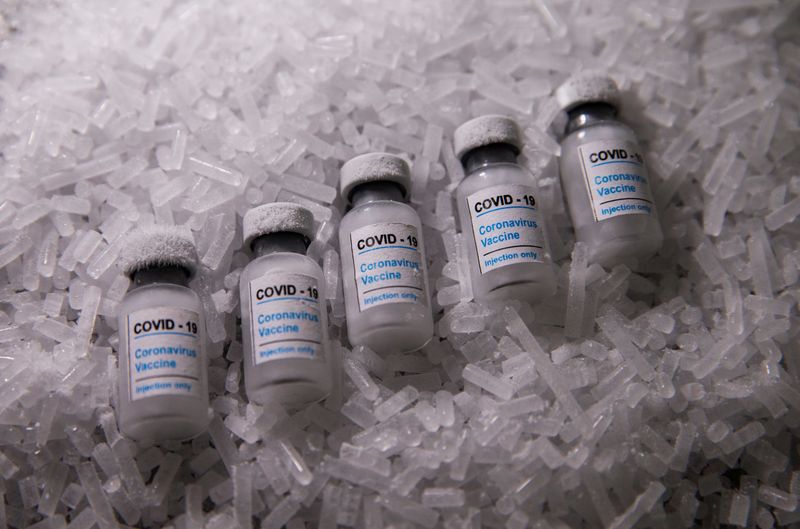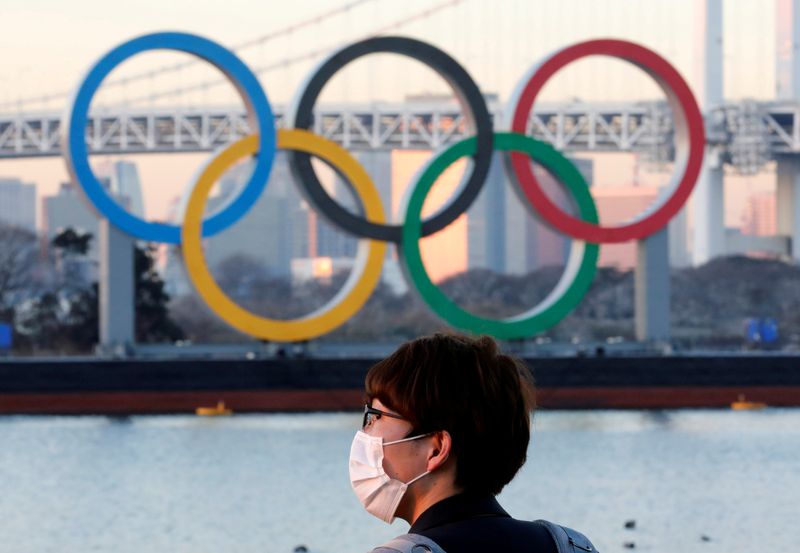By Tim Kelly and Rocky Swift
TOKYO (Reuters) - Japan's vaccination roll-out faces logistical hurdles that could further delay the slow-moving campaign, experts and officials say, complicating plans to deliver widescale coronavirus inoculations in time for the Olympics.
Already the last major industrial country to start mass vaccinations, Japan is likely to be hampered on the ground by a lack of containers and dry ice and difficulties in recruiting medical staff, more than a dozen people involved in the inoculation drive told Reuters.
Prime Minister Yoshihide Suga has said vaccines are critical to holding a successful Olympics after last year's delay. The first shots for medical workers are planned at the end of February, leaving just 145 days until the start of the Games on July 23.
Japan will need to deliver about 870,000 injections a day to inoculate half its population by then, with each person needing two shots of the vaccine.
"The government's plan puts a big burden on the individual municipalities in giving out the vaccines," said Koji Wada, an adviser on the government's COVID-19 response. "The big metropolitan areas like Tokyo may have the infrastructure to roll out the vaccinations smoothly, but more rural areas... could have more difficulty."
Companies that specialise in moving medicines say there may not be enough specialised containers to transport the Pfizer Inc (NYSE:PFE) vaccine, which has to be stored at minus 75 degrees Celsius, much colder than standard freezers.
A government source told Reuters that officials did not begin assessing whether there were enough containers or dry ice to pack freezer boxes until late last year.
Japan's vaccination tsar, Taro Kono, outlined the scale of the challenge last week. The coordination of medical workers, transport, freezer production, needle disposal and dealing with local governments are handled by different ministries, he said on Twitter.
Medical staff, already exhausted from caring for a third, deadly wave of infections, will need to be mobilised to give out shots.
The vaccine is still not approved, although that is widely expected by the middle of next month. Ahead of that, the health ministry on Wednesday carried out a mock inoculation exercise in a college gym in Kawasaki, 17 miles (27 km) south of Tokyo.
DRY ICE (NYSE:ICE)
Japan has purchased enough Pfizer vaccines to inoculate 72 million people, more than half its population. The government is buying some 20,000 speciality coolers and sourcing massive quantities of dry ice for its transportation.
Japan produces about 350,000 tonnes of dry ice per year, but it's mostly for food preservation, according to an official with one of the major makers. To transport the vaccine, the government will need either a granular or powder type of ice, which can keep temperatures colder than the standard dry-ice blocks used for food.
"It's not just a case of being able to switch a part on a machine, the production method (for the ice) is different," said the official, who asked not to be identified. "It would take several months to retool."
Transport company Nippon Express Co Ltd was involved in discussions to distribute Pfizer's vaccine, but was depending on the drugmaker to provide special containers, a spokesman said.
The company is building four specialised warehouses across Japan to store medical products, but those won't be ready until February and aren't designed for the super cold needed for Pfizer's vaccine, he said.
FREEZERS
Nihon Freezer Co, which makes industrial refrigerators, is making 2,300 coolers for the government, but without a formal contract until the first vaccines are approved, a company official said.
Those can be plugged in to any 100V outlet, the standard in Japan, although temporary vaccination centres such as schools may need rewiring.
"We have made about half of them and should have the remainder finished by June," the official said about the freezers, which are manufactured in Denmark. "Finding enough components has been difficult because of the sudden increase in production."
Medical equipment maker PHC Corp, which has been tapped by the government for ultra-low temperature freezers, said it is operating its main plant round-the-clock.
Once delivered, the vaccines must be administered by already overstretched medical workers. A Kyodo News survey showed about 80% of prefectural governments were concerned about having enough staff to give injections.
Multiple front-line doctors have said they lack manpower to deal with the crisis.
Nurses from the Self-Defense Forces have already been deployed to some pandemic-stricken cities, and could be called on again, a defence official said. The SDF has about 2,000 doctors and nurses qualified to give injections, though all can't be spared, he said.
Japan has also contracted for hundreds of millions more vaccine doses from multiple overseas makers, but those won't be mobilised for months.
That could add to doubts about the Olympics, but hurrying along the process would be worse, said Yoshihito Niki, an infectious disease specialist at Showa University Hospital.

"It's better to move more cautiously and carefully with vaccinations than to make local municipalities rush forward with preparations," he said.
